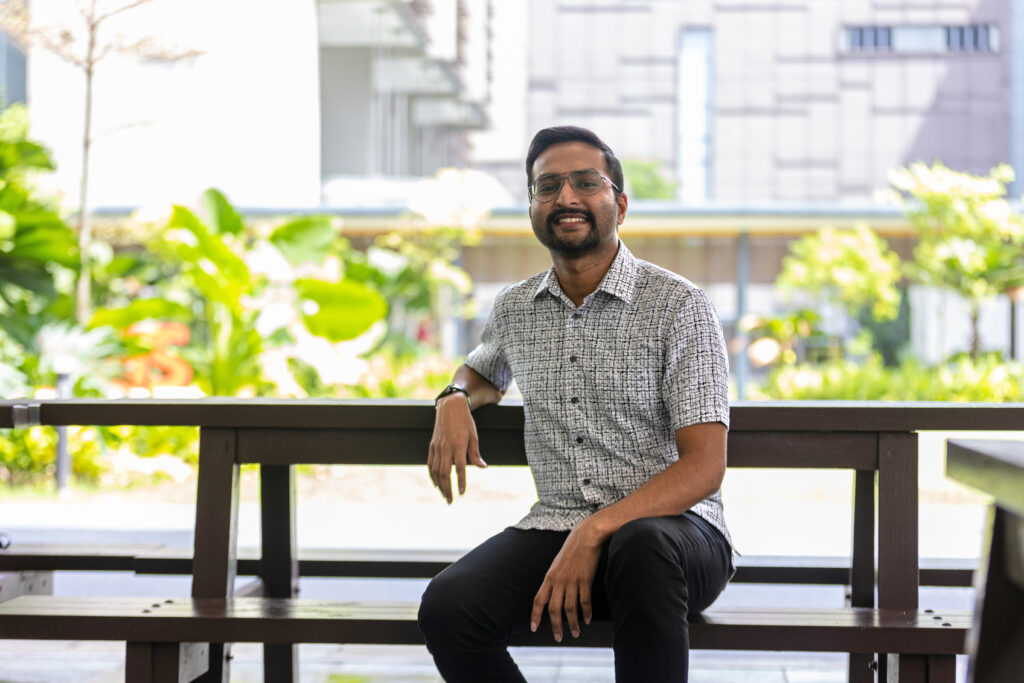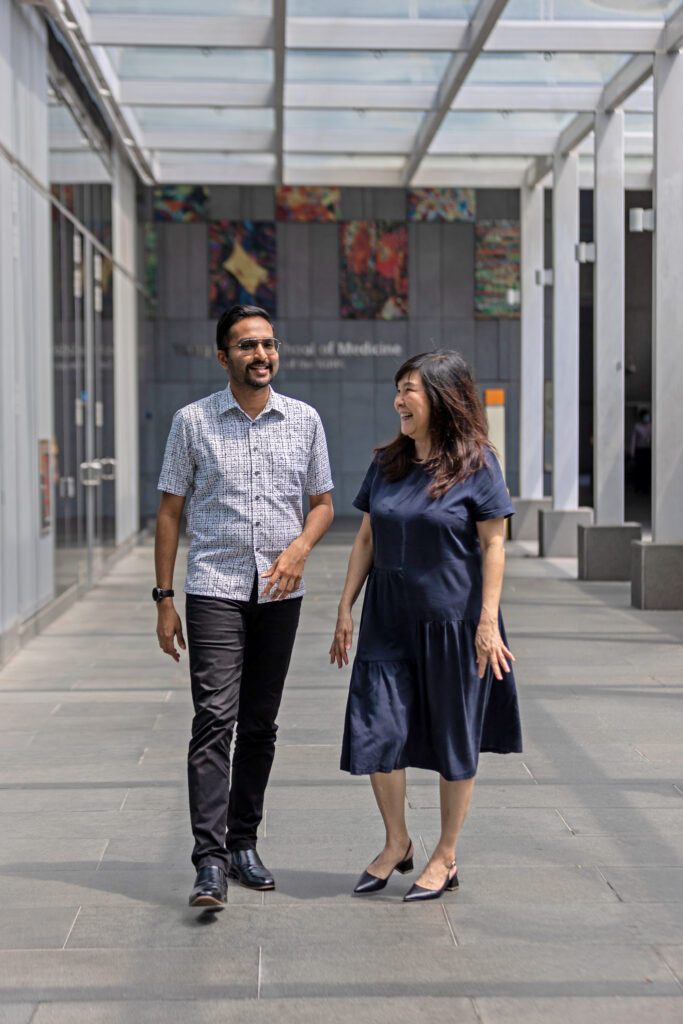A teacher’s steadfast encouragement helped alumnus Julian Ragha through a tough final year. It’s taught him to see and treat the people he works with in a different light.
“I already knew I wanted to be a nurse at 16 when I took my GCE O-Levels. I worked towards it and eventually got into NUS Nursing after my GCE A-Levels,” Julian recalled.
Looking back on his days at the Alice Lee Centre for Nursing Studies (NUS Nursing), National University of Singapore Yong Loo Lin School of Medicine, Julian remembers fondly the classes and many course mates who became close friends and caring teachers. It was also during his days at NUS Nursing when he picked up important skills, like wound dressing, which continue to serve him well today.
A tough final year
Halcyon days notwithstanding, it was his struggle towards the end of his time with NUS Nursing that transformed Julian’s perspective on community care Nursing, and ultimately led him to a career in the community care sector today. He said with a laugh, “I remember telling myself and my peers in Year 1 that I would never work in a nursing home. So my journey now is something the young me would not have imagined. But well, sometimes life can take an unexpected turn.”
The rigour of having to juggle between his practicum attachment and thesis writing in the final year took a toll on Julian’s mental health. Fortunately, Associate Professor Lydia Lau’s timely intervention steered Julian back on course to complete his studies. “Having taught Julian in a few modules, I knew him as a good student—curious, responsive, and well-liked by everyone. So when I learned that he was struggling with his practicum, I was naturally concerned and reached out to understand if he was having some challenges. And how I can support him to complete his practicum,” she said.

The touch of a caring teacher
That marked the beginning of numerous counselling sessions. Julian said, “Although so much time has passed, I can still vividly recall the round table in the level 2 meeting room where I had my scheduled sessions with A/Prof Lau. But what really struck me the most was how from the get-go, she made it clear that she was there to listen, not to judge or tell me what to do. Eventually, I found myself sharing everything with her—and she became my safe space.
“And her follow-up with me did not stop at these sessions too. A/Prof Lau took extra effort to check in with me periodically to find out how I was coping with things. She made it clear that I was not alone in this—and she would be there with me the whole way. Particularly, I’ll always remember how she specially dropped by my thesis presentation and gave me a quiet, reassuring smile. It may seem like a simple gesture, but it gave me strength and confidence to push through.”
Said A/Prof Lau “I was just doing what I should. It might be easier to take a firm approach and push Julian to finish up and graduate, stay an additional year, or take a leave of absence. But Julian was so close to the end, and it would be a pity for him to give up at that point—so I really wanted to understand how to help him. That led to working with Julian and his sponsored hospital to make various adjustments.
“In the end, it was Julian who really did it for himself. We could only do so much to support him—but he had to bite the bullet and overcome his issues. Having seen students in similar shoes, we know how hard it is to fight on. So I am tremendously proud of Julian—and he should be proud of himself too!”
The beginning of a new chapter
Julian joined the community care sector shortly after his graduation in 2015. He said, “After going through the challenging period, my perspective about Nursing changed. Where I used to look forward to the fast-paced, adrenaline pumping environment in acute care settings, I now believe that it is more meaningful to be able to build relationships with the people I care for. That is why I chose to join the community care sector.”
Having done most of his practical training in acute hospitals, Julian had to adapt to the workings of the community care sector quickly. He shared, “From simple terminologies like ‘patient’ versus ‘resident’ to the make-up of care personnel and ratio, everything is different. In a community care setting, it is not unusual for residents to have complex health conditions spanning different disciplines. Therefore, we need to have a broad knowledge of different specialties, and a good understanding of drug interactions. This is where pharmacology comes in handy.
“All in all, the community care setting tends to be more nurse-led—so we play a significant role. That means more responsibilities, but it is also empowering to know what we do has a direct impact on the residents’ well-being. For me though, the most fulfilling part of my job stems from getting to know the residents, not just what is ailing them but also the actual person—what he likes, dislikes, etc. Then there are also their families—being there for them and walking the journey alongside them.”
An ongoing transformation
After working in various capacities for eight years across four community care organisations, Julian assumed the role of executive director at Jamiyah Nursing Home in March 2023. Taking stock of his journey thus far, Julian believed that it was the challenging circumstances he had to confront in his final year at NUS Nursing that shaped him.
“Tough as it was, that experience taught me compassion—for residents and their families, my co-workers, and most importantly, myself. And in that memory, A/Prof Lydia Lau’s willingness to listen and care for me as a person also stands out. That somewhat shapes my leadership style today when I engage with my staff during appraisals, or on days when they are having a challenging time,” Julian said.
“Eight years ago, I wouldn’t be able to see myself where I am today. But as I look ahead, I am filled with hope. I know I have more to give towards improving care standards in long term care Nursing—and I am excited to keep going!”

A Letter to My Younger Self
Dear 23-year-old Julian,
I know you are having a hard time. You are scared and lonely because you couldn’t confide in anyone, except A/Prof Lydia, about your challenges. You feel like you are a disappointment to your family, your teachers, your friends—and most importantly, yourself. But I want to tell you that you turned out great. You were brave. You came out stronger on the other side.
You were angry and guilty because you think you didn’t meet your own expectations. You even kept your distance—from the school, your classmates and your teachers. But you miss them dearly. And despite your not keeping in touch, these people care for you and continue to have you in their thoughts. They miss you too. So forgive yourself. Don’t feel guilty.
Also, there is no shame. It was neither your choice nor doing to be having these challenges. Instead, you should really be proud of yourself—because I know for a fact that A/Prof Lydia Lau cannot be prouder of you (she told me).
You don’t know it yet, but you did graduate and joined the community care sector. In one of your jobs, you played a pivotal role in the planning and opening of a nursing home. More than that, you enjoyed a fulfilling career. This March, you became one of the youngest heads of a nursing home.
You might wonder if you ever got around to becoming better at handling your challenges. You did. You have learnt to ask for help, pace yourself (and not try to take on too much on your plate at one go), and bite the bullet. It is not always easy—but you know you are ready to face the past, relish the present and look towards the future.
Yours truly,
33-year-old Julian
Supporting Students with Mental Health Issues
In tandem with the growing student population, NUS Nursing has strengthened its support for students with mental health issues. Besides bolstering the student support team with a psych-trained nurse and counsellor, a team-based approach is deployed to detect troubled students earlier and provide them with support.


